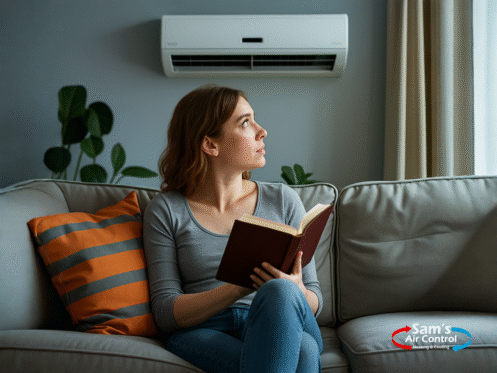With average summer highs over 80 degrees, dependable AC is essential to staying comfortable in your Edison home. A broken AC compressor can prevent your AC from delivering proper cooling power. We’ll take you through common signs of a broken AC compressor, troubleshooting for when your AC compressor has stopped working, and when to call a pro for expert air conditioner repairs.
What Does the AC Compressor Do?
The AC compressor is an essential component that moves refrigerant through your air conditioner, allowing it to cool your home. First, the compressor pressurizes the refrigerant, raising its temperature. Then it pumps the pressurized refrigerant into the condenser coil, where the refrigerant releases heat. Through this heat transfer process, the compressor moves heat from inside your home to outside.
Signs Your AC Compressor Stopped Working
The following issues are common signs that your AC compressor is not working:
AC is blowing warm air
The condenser is responsible for moving refrigerant, which is the substance inside your AC that cools your home. If the condenser fails to move refrigerant, the heat transfer process stops. If the rest of your AC works and the fans are still blowing, this can result in warm air being recirculated through your home.
Loud noises
A broken condenser can lead to a variety of loud and unusual noises, including clicking, clunking, and rattling. When your AC is working properly, it should produce only minimal noise, usually a low hum. If you notice any sounds that are out of the ordinary, it’s a good idea to call an AC pro.
Leaks around the compressor
The compressor is located inside the condenser unit in your AC. If you suspect a condenser issue, you can visually examine the area around the compressor to check for leaks.
Rising energy bills
When your condenser is struggling, your AC will use more power to cool your home. A gradual rise in your power bill can indicate a compressor that’s slowly failing due to wear and tear or a tiny leak. A sudden spike in your bill may mean a broken part that’s quickly impacting AC efficiency.
AC won’t turn on
Many air conditioners come with safety features that trigger automatic shut-off if an essential component malfunctions. A broken condenser may prevent your AC from starting at all, or it may cause other electrical issues like tripping the circuit breaker or AC short cycling.
What It Means If the AC Compressor Fan Stops Spinning
If your AC compressor fan stopped spinning, it may mean a mechanical or power issue, or it could be a bigger problem with the compressor itself.
Power issues
In most cases, a major power issue will cause the entire AC unit to turn off. If your compressor fan has stopped spinning, start by checking the unit power and the circuit breaker to make sure that there is power flowing to your AC.
Overheated compressor
Problems with your AC compressor can cause the unit to overheat, triggering the safety mechanism to shut off or trip the breaker. While you can usually turn the power back on and run the AC for a little while, this is a signal of a bigger compressor issue that needs to be addressed by a pro.
Dirty air filters
A clogged or dirty air filter can impact almost every part of your AC. When your air filters become too dirty, they restrict airflow which can get in the way of the compressor fan functioning properly.
Broken fan motor
There may be an electrical issue disrupting power to the fan, or a mechanical issue with a fan component. If it’s the former, the fan may simply spin slowly or not at all. If it’s the latter, you may hear noises like bumping or clunking which can indicate a broken part.
AC Compressor Troubleshooting
If your AC compressor isn’t turning on, try the following troubleshooting tips to diagnose the problem:
Step 1: Check the power
Start by checking the power to your AC, particularly if you’ve recently had a power outage. Check the power button on your AC to make sure it’s turned on and then check your circuit breaker — most air conditioners have only one breaker switch, but some may have two that power different parts of your AC.
Step 2: Test the thermostat
Check that your thermostat has fresh batteries and make sure that it’s not located directly beside a window, in a sunbeam, or in front of a vent. These can all cause it to provide inaccurate temperature readings that can disrupt your AC.
Step 3: Change the air filters
Dirty air filters can damage your condenser and prevent air from flowing smoothly through the system. Energy Star recommends changing your air conditioner filters every three months, or as recommended by the manufacturer.
Step 4: Visually examine the compressor
If you’ve changed the filters and your AC still isn’t working properly, you can conduct an examination of your AC compressor. Look for any obvious broken parts or leaks and listen for unusual sounds.
Safety note: DIY heating and cooling repairs can be dangerous. When conducting your examination, limit the inspection to visual and auditory. The condenser is a vital and delicate part of your AC, and it moves refrigerant which is hazardous to health — avoid touching the condenser.
When to Call a Professional
If you notice any of the following issues, call an HVAC professional for air conditioner compressor repair.
You suspect a refrigerant leak
Refrigerant is a hazardous substance that can be harmful to health if it ends up outside of your AC. If a compressor problem leads to a refrigerant leak, you may notice liquid pooling around your AC or a sweet, slightly chemical smell. If this happens, turn off your AC and exit the home immediately, then call your HVAC pro to repair your AC.
Your AC compressor is 10 to 15 years old
Most modern air conditioners have a lifespan of roughly 10 to 15 years, although this can sometimes be extended with regular AC maintenance. If your AC compressor is reaching this age, there’s a good chance that wear and tear may be causing issues that require a professional fix.
You’re not sure what the problem is
Your AC won’t run without a working compressor, so professional repairs are key to making your home comfortable again. If you’ve conducted basic troubleshooting by testing the power and changing the air filters, the safest option is to call an expert who can safely and effectively diagnose the problem.
Call Sam’s Air Control for AC Compressor Issues in Edison, NJ
The friendly team at Sam’s Air Control brings you prompt and professional service for all your AC issues in the greater Edison area. Our licensed HVAC technicians have the tools and knowledge to safely tackle all your heating and cooling challenges with professional expertise. Whether you’re looking for routine maintenance or emergency repairs, schedule your service today, and we’ll get your Edison home cool and comfortable again.


